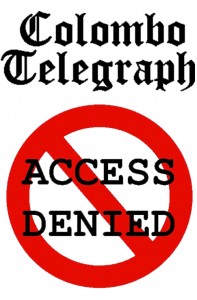A Brief Colonial History Of Ceylon(SriLanka)
Sri Lanka: One Island Two Nations
A Brief Colonial History Of Ceylon(SriLanka)
Sri Lanka: One Island Two Nations
(Full Story)
Search This Blog
Back to 500BC.
==========================
Thiranjala Weerasinghe sj.- One Island Two Nations
?????????????????????????????????????????????????Thursday, February 27, 2014
Sri Lankan Govt. Periodically Blocked Colombo Telegraph In 2013: US Human Rights Report

Sri Lankan Govt. Periodically Blocked Colombo Telegraph In 2013: US Human Rights Report
The Sri Lankan Government periodically blocked access to the Colombo
Telegraph website as well as several Tamil news websites including the
pro-LTTE Tamilnet, a US State Department report on Sri Lanka's human
rights situation in 2013 said.
- Internet Freedom- See more at: http://www.state.gov/j/drl/rls/hrrpt/humanrightsreport/index.htm?year=2013&dlid=220404#wrapperThe government restricted access to the internet, including websites it deemed pornographic, as well as websites it deemed critical of the government. The government periodically blocked access to the Colombo Telegraph’s website, as well as several Tamil news websites, including the pro-LTTE TamilNet. Since 2011 the Ministry of Mass Media and Information required websites carrying local news to register with the government. The ministry blocked access to certain websites after receiving complaints about material that was “injurious to the image of the country, the head of the state, ministers, senior public officials, and other important persons.” Thereafter, the ministry blocked 10 websites, although one of those sites subsequently was unblocked. Additionally the government blocked various other news websites throughout the year. In May 2012 a three-member bench led by Chief Justice Shirani Bandaranayake dismissed a fundamental rights case filed against the blocking of websites.In June 2012 the CID raided the offices of independent news website Srilankamirror and official opposition UNP news website Srilankaxnews. During the raid CID officers arrested eight journalists for writing negatively about the government and president and for allegedly publishing false information. The CID entered with a warrant under existing laws, including penal code 120, which permits imprisonment for “attempts to excite feelings of disaffection to the president or to the government…or attempts to raise discontent or disaffection amongst the people of Sri Lanka.” The cases against the journalists were suspended pending further evidence. The CID continued to hold the websites’ computers, which it seized in November 2012. The Supreme Court was scheduled to hear a fundamental rights case filed by journalists from the Sri Lanka Mirror in February. As of year’s end, no further information was available.
 Country Reports on Human Rights Practices for 2013Country Reports on Human Rights Practices for 2013 Global Overview includes an overarching summary and key information from the year's report. Hover over Countries/Regions for a list of countries and other areas. Click a region to narrow the list. Click a country or other area to see that report.
Country Reports on Human Rights Practices for 2013Country Reports on Human Rights Practices for 2013 Global Overview includes an overarching summary and key information from the year's report. Hover over Countries/Regions for a list of countries and other areas. Click a region to narrow the list. Click a country or other area to see that report.
Posted by
Thavam


